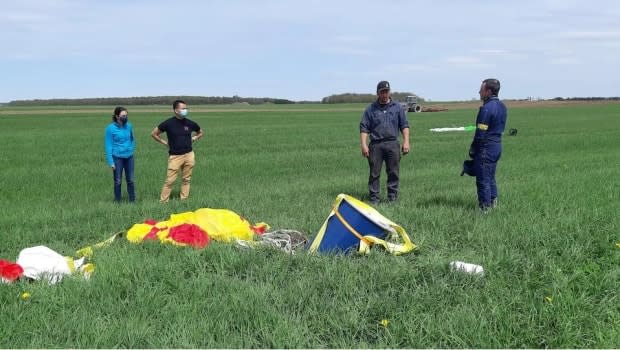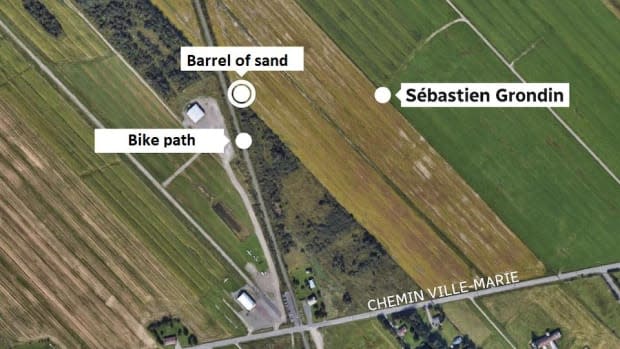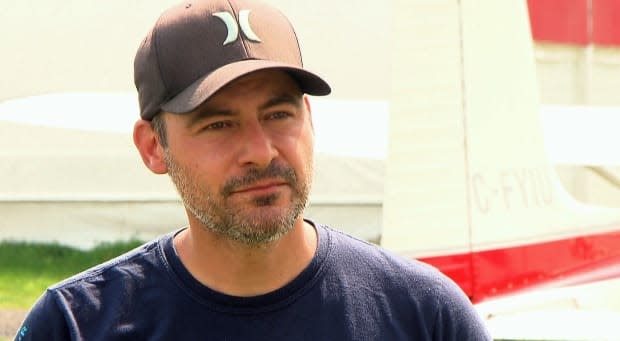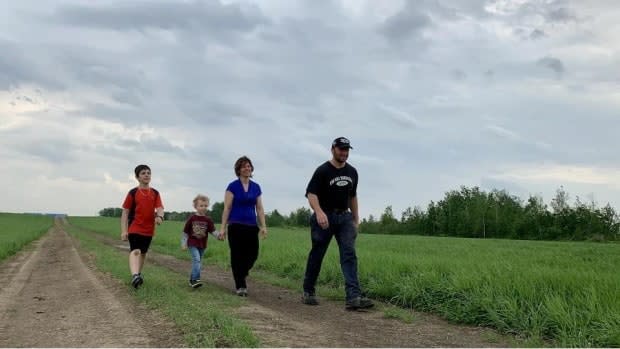Quebec farmer irate after barrel of sand dropped from plane torpedoes into his land

Sébastien Grondin was driving his tractor through his field in Lévis, Que., when he noticed some skydivers floating down onto his land.
It wasn't a surprise as he's not far from Parachutisme Atmosphair, a company that offers people the thrill of jumping out of a perfectly good airplane. It was only when they approached that he learned how close he had been to being killed by a UFO — an unusual falling object.
"It could have fallen on my head," said Grondin, who snapped a photo of the 318-kilogram barrel of sand that, with a shredded parachute still attached, had sunk into the hard-packed clay.
The barrel, which weighs about as much as a muskox, was only about 20 metres from a bike path.
"When I turned around, people were passing on the bike path," said Grondin. "It was one bicycle after another."
As for Grondin, he was about 100 metres away from the crash site, roughly the length of a football field.
The dairy farmer said he tolerates the occasional parachutist landing on his fields even though they can damage his crops, but this incident, which took place on May 18, was over the top.
He doesn't want a repeat of this "completely crazy" experience, he said.

Skydiver says barrel hit off target
Parachutisme Atmosphair co-owner Maxime Sénécal said he made an arrangement with the two farmers who own the land where the barrel was supposed to land with a parachute cushioning its fall.
He said he calculated the drop carefully, but "it didn't land in the right field. And the parachute doesn't seem to have worked."
He said there are risks that come with parachuting, to both the person jumping and those below. It's a good thing, he added, that they were testing the parachute on a barrel and not a human.
The skydiving company was doing the experiment in collaboration with Concordia University students who are participating in an international competition. He said the barrel was dropped from about 915 metres above sea level, testing the attached parachute.

Sénécal said his certification allows him to drop objects from planes as long as they have a parachute. He's been doing it for nearly three decades, he said, and he was happy to work with the school and put Lévis on the aerospace map in Canada.
Sénécal did apologize to Grondin soon after the barrel touched down, explaining to him that it was an experiment.
Grondin discovered his two neighbours were warned about the barrel drop, but nobody mentioned the barrel would weigh about as much as a touring motorcycle. The neighbouring farmer said he too would have liked a warning.
Transport Canada is investigating
A spokesperson for Transport Canada confirms that the agency has opened an investigation into the incident.
In an email, the spokesperson says section 602.23 of the Canadian Aviation Regulations prohibits anyone from endangering people or property on the ground by dropping an object from an aircraft in flight.
An offence can lead to a $5,000 fine for an individual or $25,000 for a corporation.

As for Concordia University, the event was not taken lightly.
"We are aware that there was an element of luck that no one was injured as a result of this experiment," said associate professor of aerospace engineering, Charles Basenga Kiyanda.
He said the students needed a certain expertise to test the homemade parachute, and after contacting about a dozen companies, Atmosphair was the only one to reply.The company provided services at reduced cost, and got visibility in return, he said.
Basenga Kiyanda said the school will review its policies on test preparation and making arrangements with external companies.
Meanwhile, the students are still plugging away at their ambitious project which involves creating the first civilian liquid fuel rocket. A few dozen universities across North America are competing for a $1-million prize.

